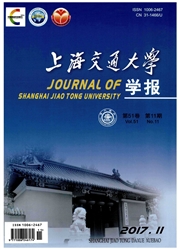

 中文摘要:
中文摘要:
为了在多输入多输出(MIMO)系统中多用户下行信道的系统吞吐量、基站的稳定性和用户间的公平性等因素间取折衷,引入层次分析法的思想.在半正交用户选择(SUS)算法的基础上,针对信道状态条件、用户在基站缓冲区的队列长度和用户的重要性等因素,设计可根据基站缓冲区的拥塞情况动态调整的用户调度策略.仿真结果表明,提出的改进算法可在降低算法的时间复杂度的前提下,兼顾系统的稳定性与用户间的公平性,并保证系统仍然具有较大的吞吐量.
 英文摘要:
英文摘要:
The algorithm of semi-orthogonal user group (SUS) is improved on to coordinate user scheduling, stability of the base station and fairness among users in the wireless downlink communication system, involving jointly the channel state condition, the queue length of the buffer of base station and users~im- portance through analytical hierarchy process (AHP), and therefore a dynamic scheduling strategy sensitive to the congestion state of the buffer is available. The analysis results show that the proposed algorithm considers both stability and fairness of the whole system, and guarantees that the throughput descends on- ly a little compared to the optimal condition, based on a low time complexity.
 同期刊论文项目
同期刊论文项目
 同项目期刊论文
同项目期刊论文
 期刊信息
期刊信息
